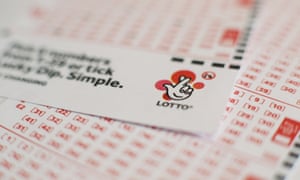
The federal government has released details of a national sports plan, central to which is an idea to implement a lottery for funding inspired by examples around the world such as the UK model, and the creation of an independent sports tribunal.
The sports minister, Greg Hunt, unveiled the initiative at the Australian Institute of Sport on Monday, outlining a vision for sport in Australia for the next 10 years while attempting to allay fears a lottery would encourage gambling.
The plan, which focuses on four central themes – participation, performance, promoting health through physical activity, and integrity – will be introduced as part of the 2017-18 budget.
It is open for public submissions until 31 July, and Hunt promised key stakeholders – including the states and territories, the Australian Sports Commission (ASC) and their respective sports, the Australian Olympic Committee (AOC) and Paralympic Committee and Commonwealth Games Australia – would be consulted.
The government said it was seeking to understand Australia’s expectations of the sports sector through the creation of a national plan.
“The question of funding is always important,” Hunt said. “This plan will consider, with a strong bias towards support, a national sports lottery. There are great examples around the world, most notably the UK, of funding on a secure basis coming from a national sports lottery.”
When asked if a lottery would add to Australia’s gambling problem, which is particularly prevalent in sport, Hunt again highlighted the example of the UK.
“The way this works is this is a public-good lottery and that concept is something that is well accepted,” Hunt said. “We see in Western Australia a public-good lottery, we see in the United Kingdom public-good lotteries.
“That’s a very accepted approach and it is a sensible way to provide additional permanent sports funding which I think is fair, reasonable [and] appropriate.
“If you have it legislated and highly regulated and it’s a public-good lottery then that’s sensible.”
As with the UK model, Olympic sports would stand to benefit from lottery funding and the announcement was welcomed by the Australian Olympic Committee.
The AOC chief executive, Matt Carroll, said the initiative was “critical” for Australia’s sporting future. “The national plan will bring clarity on the roles and responsibilities of all the parties involved and establish the support, infrastructure and funding required to achieve the collective sporting outcomes for the country,” Carroll said.
Hunt said the plan for a lottery, which has the potential to deliver up to $50m a year, had the backing of the ASC chairman, John Wylie, and John Coates, the recently re-elected president of the AOC, both of whom have long been advocates of the idea.
In the UK, sport has benefited from lottery funding since 1997. Since then, British athletes have won 633 Olympic and Paralympic medals and GB have re-emerged as an international sporting power.
The establishment of a sports tribunal – something of a national equivalent to Switzerland’s court of arbitration of sport – aims to address the plan’s final aim of integrity.
Hunt said without an independent body, sports are effectively able to sit in judgment of themselves in matters such as doping, a situation that “we should move beyond”.
“There are always the players who are in the shadows and we want to keep those out of Australian sport and we want to rub them out of Australian sport,” Hunt said.
Any national tribunal would need the cooperation of each individual sport, but Hunt was confident there would be a willingness to participate and said he would be surprised if there was an Australian sport that wouldn’t opt in.
The former chief executive of the Australian sports anti doping authority (Asada), Richard Ings, welcomed the initiative and said a central independent tribunal was both “essential” and “overdue”.
Hunt said the government hoped to have the plan finalised and in place by the end of this year.
